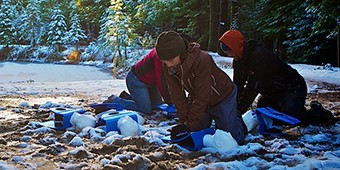
Delivering traditional emergency medical care at ground zero of natural disasters and military conflicts is challenging. First responders trained in simple integrative medicine approaches such as acupuncture, hypnosis, or biofeedback can provide adjunctive treatment to help relieve patients' pain and stress. When most people think of first responders, they think of paramedics or combat medics or other medically-trained personnel doing CPR and other life-saving procedures in stressful situations.
A review article in Medical Acupuncture – since it is a review, it is collating other articles about acupuncture, rather than science or medicine – argues that first responders should be trained in integrative medicine approaches such as acupuncture, hypnosis and biofeedback to provide adjunctive treatment to help relieve patients' pain and stress. Maybe they could teach some yoga and the benefits of organic food during the next earthquake as well.
Could first responders make use of acupuncture and integrative medicine in natural disasters and battle zones? According to a new review the answer is yes.
Delivering traditional emergency medical care at ground zero of natural disasters and military conflicts is challenging. In the recent past, according to the authors, numerous natural disasters and wars have resulted in casualties on site that have been treated successfully by trained personnel using holistic medical techniques, including acupuncture, hypnosis, yoga, biofeedback and other techniques.
First responders trained in simple integrative medicine approaches like these – adapted where necessary for the extreme circumstances that they face – can provide adjunctive treatment to help relieve patients’ pain and stress say the authors.
The authors say they are not representing the views of the United States Air Force Medical Corps, the Air Force at large, or the Department of Defense. Nevertheless, they conclude that the studies discussed in their review, and …
Disasters happen and when major disasters strike they put considerable strain on the system. This may be partly because of the potential scale of the number of injuries but also because a major event can disrupt the infrastructure that should help to deliver relief. The nature of the problem may be a major outbreak of an infectious disease, a massive accident, a natural disaster or even an act of terrorism. The matter may be compounded by panic by those caught up in the disaster and there will be the long-term sequelae to manage.
Please Read this Article at NyrNaturalNews.com





Leave a Reply